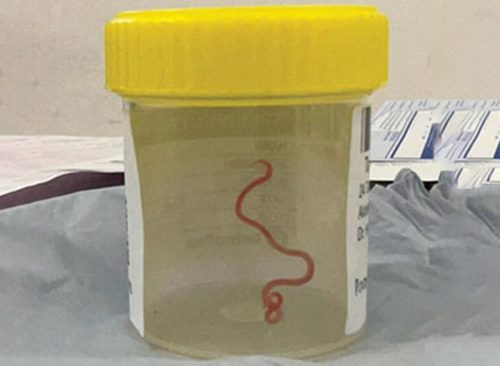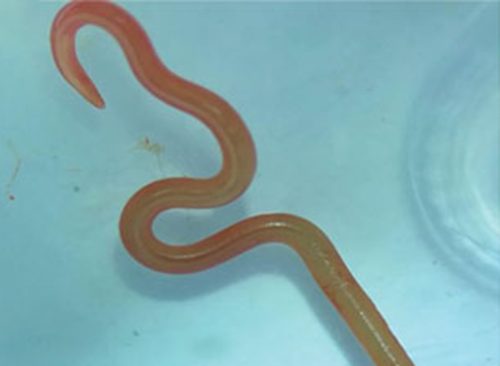3-Inch Live Worm Found Woman’s Brain in World-First Discovery
It took 18 months for doctors to find out what was behind a woman’s mysterious symptoms.
While it is not an everyday occurrence at real hospitals, nearly every medical or hospital drama, including House and Grey’s Anatomy, has a patient who comes in and finds out they have some sort of worm or parasite in their brain. However, in 2021, it actually happened to a 64-year-old woman in New South Wales, Australia. Unfortunately, it took over a year for medical experts to figure out that the worm was responsible for the slew of symptoms she was experiencing. Here is what you need to know about the world-first discovery.

The Washington Post reports that the woman arrived at a hospital in January 2021 complaining about various symptoms. They included three weeks of abdominal pain, a dry cough, and night sweats. After conducting tests, they discovered lesions in her lungs, liver, and spleen and an abnormally high white blood cell count.

The doctors initially thought the high blood count signified that her body was fighting an infection. However, after conducting more tests, they discovered no signs of bacterial or fungal infections, nor did they detect parasites.

For 18 months, they struggled to diagnose her, and her symptoms worsened. They started to include forgetfulness and depression.

In June 2022, doctors finally detected what was responsible for her symptoms: It was a three-inch-long roundworm in her brain that was alive and wriggling. Researchers write about the ordeal in Emerging Infectious Diseases, a peer-reviewed journal published by the U.S. Centers for Disease Control and Prevention.

A surgeon extracted the worm from within a lesion in the woman’s brain. According to researchers, the type of parasite, a larva of the Ophidascaris robertsi species, had not previously been reported inside a human brain.

“It sounds like a Dr. House episode,” Mehrab Hossain, an infectious-diseases physician at Canberra Hospital, said in an interview with The Washington Post, confirming that it isn’t common to find one in a human.

While some kinds of roundworms infect humans, researchers explain that the type found in the woman’s brain are commonly found in the stomachs of carpet pythons, which reside in Australia. The snakes shed the eggs in their feces, which are sometimes eaten by small mammals, like rats. They then grow as larvae before reentering a snake when it eats the mammal.

“It was just a matter of time,” Šlapeta said. “… I’ve seen these worms in all sorts of places, of other animals, and so far, the human was just missing.”

The woman lived near a lake inhabited by carpet pythons. Researchers believe she possibly ingested dirty vegetation contaminated with O. robertsi eggs. While the larva usually stays in the stomach, it may have burrowed into other organs, like her liver. They added that the roundworm’s survival in the woman’s body may have been aided by the immunosuppressants she was prescribed to treat her high white blood cell levels.
RELATED: Kayaker Swallowed by Humpback Whale Tells Her Amazing Survival Story

The case has drawn attention because it demonstrates how difficult it is to diagnose parasites. “Hopefully, highlighting the possibility of human infection with this parasite might lead to other cases being identified in other parts of the world and other cases being treated as well,” Sanjaya Senanayake, an infectious diseases physician who treated the woman after her surgery, said. The woman’s reaction to the diagnosis was “a mixture of shock, horror, and relief, which I think all of us felt as well,” Senanayake said.















